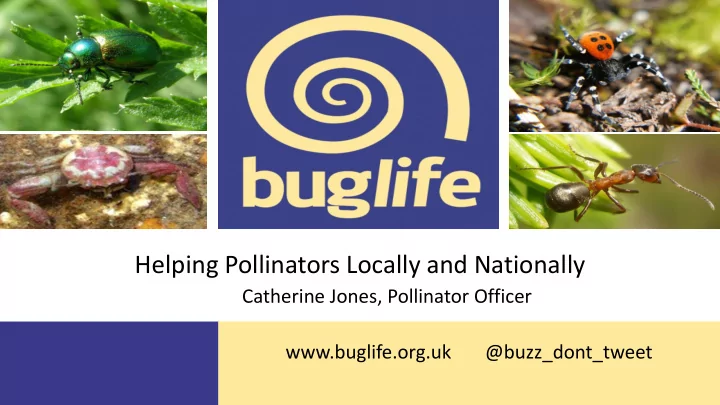

Helping Pollinators Locally and Nationally Catherine Jones, Pollinator Officer www.buglife.org.uk @buzz_dont_tweet
Overview • Buglife – The Invertebrate Conservation Trust • Pollinators: a key priority in Wildlife Strategy • Local Pollinator Action Plan • B-Lines across the UK
The Invertebrate Conservation Trust Europe's only organisation devoted to Conservation of ALL invertebrates
‘Saving the small things that run the planet’
The Invertebrate Conservation Trust Aim: Halt the extinction of invertebrates and Achieve sustainable populations • 40,000 invertebrate species in the UK
The Invertebrate Conservation Trust No ‘ Insectinction ’ ‘Insect declines and why they matter’ Goulson for Wildlife Trusts Adapted from: We are losing the “Little things that run the world” UN Environment 2019
Our Amazing Pollinators 6,000 species in Britain!
Why are pollinators important? Insect pollination is essential to maintain a healthy and thriving natural environment 80% of wild plants are pollinated by insects
Why are pollinators important? Food • 1 in 3 mouthfuls of food is pollinated by insects Including chocolate!
Decline in wild pollinators Why? • Loss of habitat including wildflower-rich grassland • Fragmentation of remaining natural habitats • Pesticides • Pollution
Our pollinators are in trouble… but we have a plan!
The importance of pollinators
Helping pollinator locally A Local Pollinator Action Plan or Strategy • Advice for local authorities • Developing • Implementing Road verges https://cdn.buglife.org.uk/2019/07/Helping- Pollinators-Locally.pdf
Urban Buzz Phase 1 (2015-17): Birmingham, Cardiff, Plymouth, York Phase 2 (2017-19): Bristol, Ipswich, Leeds , Leicester, Mid Cornwall Thanks to the generous support of:
B-Lines across the UK What are B-Lines? A network of routes linking together our best existing wildflower sites connecting wildflower rich areas for pollinators and people
What do pollinators need? Food • Flowers - Pollen and nectar • Larval food (plants) Nesting sites Overwintering sites Larval habitats
Food through the seasons Legumes, composites and umbellifers provide summer food. Bramble and rose have Spring Autumn a long flowering season Trees and shrubs Thistle, yarrow and provide pollen and scabious provide nectar early in the early autumn food. season Ivy often important food resource in autumn. Summer
Importance of native plant species • Native plants support more invertebrates than non-native
Nesting sites Bumblebees Disused mammal holes, holes in trees, tussocky grass Solitary bees Dig into bare soil, in snail shells and woody stems, in holes in dead wood, often construct cells with mud or leaves
Why B-Lines? To provide a network of routes linking together our best existing wildflower sites connecting wildflower rich areas for pollinators and people
Everyone can contribute to B-Lines Working in partnership with: Conservation partners Local Councils Farmers Communities Businesses Schools Volunteers
B-Lines methodology • Using existing habitat data and working with partners to identify a network of routes connecting our best existing wildflower-rich areas for pollinators. • Identifying opportunities for creating, enhancing and managing habitats for pollinators
The B-Lines network 2019
B-Lines mapping project https://www.buglife.org.uk/our-work/b-lines/
B-Lines mapping project We are currently mapping the unmapped areas of England • Devon • Dorset and Somerset • Wiltshire and Gloucestershire • Herefordshire and Shropshire • Berkshire, Hampshire, Surrey and Isle of Wight • Warwickshire and Worcestershire • Cheshire, Derbyshire and Staffordshire Can you help us? Thank you
Helping Pollinators Locally and Nationally Catherine Jones, Pollinator Officer Catherine.jones@buglife.org.uk www.buglife.org.uk @buzz_dont_tweet
Recommend
More recommend